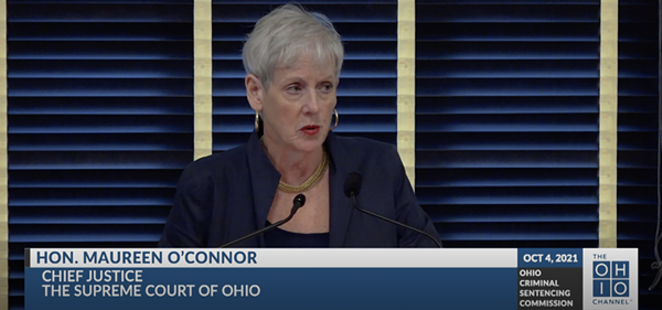The Ohio Supreme Court and the University of Cincinnati this week announced a joint project that will create a statewide database of criminal sentencings, a first-of-its-kind across the nation.
With an $800,000 allocation by the court, students and faculty at the university will begin collecting sentencings from common pleas judges in the state who opt into the program. So far, 34 of the 244 judges have done so, and more are signing up every week.
Rather than tracking decisions made by individual judges to single out their trends, the database will compare sentences across the state by the broader demographics of those who are sentenced to identify inconsistencies.
“It will be even more fine-tuned,” Ohio Chief Justice Maureen O’Connor said in a press conference this week. “African American men, with this kind of record, this level of education, this level of employment, who lives here, etc. You put all those variables in, and you get much a more accurate response... This is about the big picture and what is happening in Ohio in the big picture with sentencing."
Last year, as the court worked on a one-county pilot program with an eye on expanding statewide, O'Connor told the Columbus Dispatch the database would be an essential tool in working toward bias-free sentencing, one that would educate judges and rebuild the public's trust after a year of social justice protests.
“Our lack of knowledge about sentencing reverberates in the public as lack of confidence in you and me and our judiciary system. You, as a judge, are being forced to fly blind — and that’s not fair to you. ... It’s important that our judges sentence with consistency," she said. “For the public to be informed — and for truth to win out over rumor and fiction — they must be able to see equal justice for all and understand how it is measured. This database will give us a foundation for fairness and objectivity that will change how we do our jobs, and it will be a change for the better.”
Two recent cases in Cuyahoga County have put the issue of sentencing disparities once again in the forefront of criminal justice reform discussions this year, as Cleveland.com reported in its series on a "white woman who stole $250,000 and received probation while a Black woman who stole $40,000 was sentenced to jail."
Video coverage of the court's joint announcement with the University of Cincinnati is below.
This story was originally published by CityBeat sister paper Cleveland Scene.
Sign up for our weekly newsletters to get the latest on the news, things to do and places to eat delivered right to your inbox.






